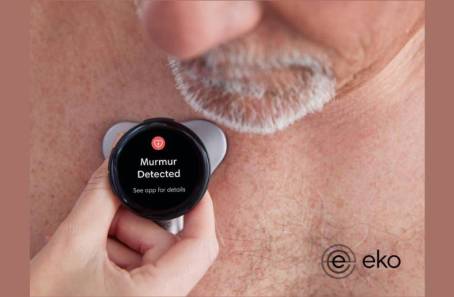René Laennec, a French doctor, made a tool in 1816 that let doctors listen to people’s hearts and lungs. The stethoscope went from being a simple wooden tube to a light version with two earpieces that most doctors wear around their necks today.
A company called Eko Health, which was formed in 2013, is bringing this common medical tool into the digital age by adding AI to it. The stethoscope was made by Eko and has been sold to more than 500,000 doctors and other health care workers over the past ten years. Because they’ve been used on millions of patients, the company has a big set of chest sounds and electrocardiogram (ECG) data. Eko used this data to create different algorithms for finding heart problems.
“Exams with a stethoscope are very inconsistent and wrong.” “Patients get diagnoses too late or the wrong ones,” said Connor Landgraf, CEO and founder of Eko Health. “We want to use AI to bring precision that could help patients get earlier, better diagnoses.”
Landgraf said that a regular stethoscope doesn’t always let a doctor hear the small changes between healthy and sick people. “They can use our AI to combine [heart sounds] with cardiac rhythm assessment and then have the AI figure out what it all means.” “You have almost all the skills of a cardiologist in the pocket of a primary care doctor, nurse practitioner, or frontline health care worker,” he said.
The FDA gave the Eko stethoscope permission in April to use its AI to help find the first signs of heart failure during a regular medical check. That’s the third algorithm that the company has gotten FDA permission for. Eko’s AI was also just given the go-ahead to find heart sounds, which could mean that the heart valves aren’t working right. A study from Massachusetts General Hospital found that Eko’s AI found more than twice as many people with heart disease than primary care doctors.
Eko raised $41 million in a Series D round led by ARTIS Ventures, Highland Capital Partners, NTTVC, and Questa Capital. The money came from trial milestones. With this new round of funding, the company now has a total of $165 million.
With the new money, the company can train AI systems to find lung diseases like asthma and pneumonia and sell its device and software that goes with it to doctors outside the U.S.
A partner at ARTIS Ventures named Vas Bailey said, “Of all the things I invested in, Eko may be one of the most useful because it’s so easy to use to change outcomes.” On Bailey’s 11th birthday, his father died of heart failure. “We can find more issues with the heart when you go to the doctor for a regular checkup.” As part of your test, we might be able to save your life. It might have been able to save my dad’s life.
Also Read: ‘maybe a Third’ of Us Citizens Were Affected by the Latest Hack, Says the Ceo of Unitedhealthcare
While no one else has put AI into a stethoscope, Ultromics and CardioSignal are two startups that use AI to find heart problems.
What do you say about this story? Visit Parhlo World For more.


